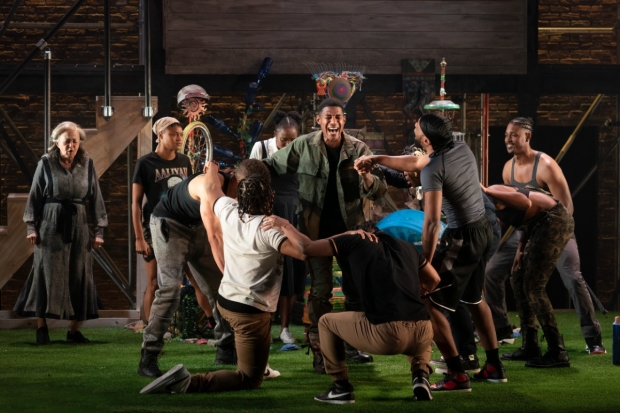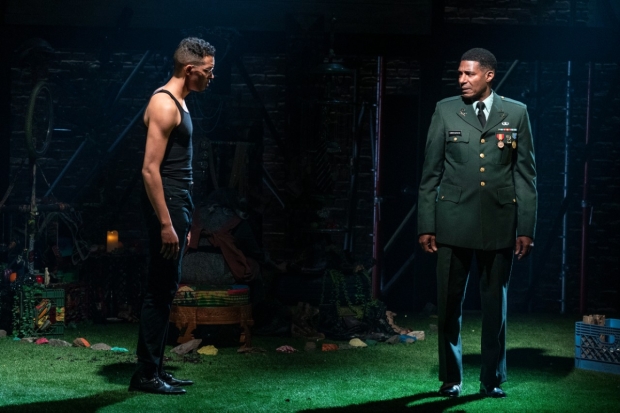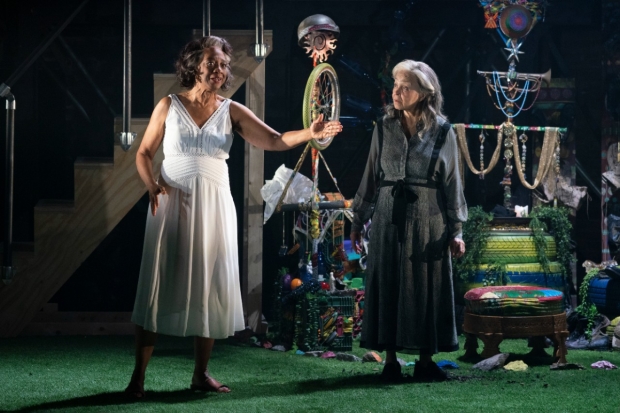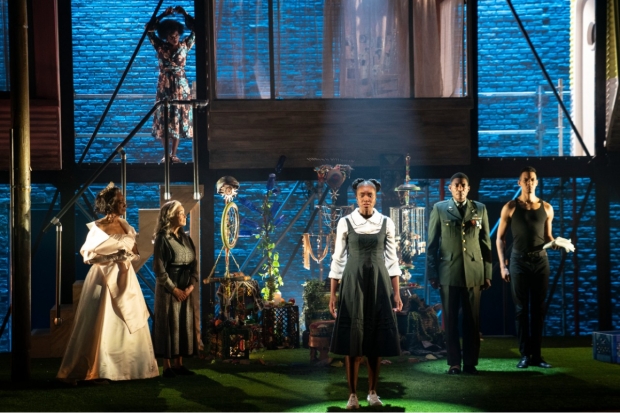Review: In the Midst of War, On Sugarland Grieves and Celebrates All at Once
Aleshea Harris and Whitney White craft a sprawling new work that blends Black storytelling with a host of other theatrical traditions.

(© Joan Marcus)
The death count rises in Ukraine while children of Russian oligarchs scurry to hide their yachts and pray that elite foreign universities will keep their seats warm. War, unfailingly, is an absurd exercise in stratified exploitation, and Aleshea Harris has found a choice time to poke at the smoke and mirrors of its glories. Actually, she unabashedly decimates it in her new play at New York Theatre Workshop, On Sugarland, which deserves the title of epic as much for its sweeping content and alchemy of theatrical styles as for its daunting length.
Clocking in at two hours and 45 minutes, On Sugarland patiently marches alongside a Black community at the end of a mobile home-lined cul-de-sac in the American South as its residents go about their daily rituals, most of which involve mourning their dead. This is a people bound to perpetual war, and Harris blends folk tale with Greek tragedy to create a heightened, lyrical atmosphere — untethered from time, place, and even laws of physics. Director Whitney White, with a confident vision of this dramatic no-man's land, reassures the audience that the who, what, when, and where of it all is irrelevant (as it usually is when nations find themselves at odds).
"Why" becomes the only lingering question that gains some relevance as parents and children dutifully go off to face their deaths. Their only solace becomes the exuberant "holler" of mourning promised to them when their bodies are (or aren't) returned home and their souls are laid to rest in this community's sacred burial ground called Sugarland (scenic designer Adam Rigg perfectly captures the spirit of jubilant lamentation in his colorful, found-objects sculpture that serves as the centerpiece of Sugarland).

(© Joan Marcus)
Surely it's no accident that this memorial space shares its saccharine name with the Texas suburb that once held many a sugar plantation — and is now home to a collection of crumbling headstones marking the graves of convicts forced to work the land as slaves through the post-Civil War convict-lease system. Sophocles' mythological play Philoctetes serves as Harris's broad inspiration for On Sugarland, with ex-soldier Saul (a defining performance by Billy Eugene Jones) loosely playing the role of the mythical fighter whose fetid foot wound caused his fellow soldiers to abandon him amid the Trojan War (the debated origins of Saul's wound puts his noble character into question).
A Greek chorus called The Rowdy adds to this air of classical structure. And yet, as if Harris and White were waging their own war on white-washed theatrical traditions, our Greek chorus abandons rigidity and takes on a physical fluidity and raucous energy that draws out this community's distinctly Black traditions of expression and storytelling (costume designer Qween Jean dresses the ensemble in character-specific street clothes, while Raja Feather Kelly contributes social dance-inspired choreography).

(© Joan Marcus)
The primary narrator is Sadie (the phenomenal and grounded KiKi Lane), a 14-year-old girl who has lost her mother to the war and has largely been raised by her alcoholic aunt Odella (Adeloa Role in a performance blending humor and pain), who mourns her own life and that of her lover who did not get a hero's holler. A silent observer, Sadie can wake the dead (and does so in order to check on her mother's lost soul), and speaks exclusively in soliloquy. She tells us stories of her great-great-great-grandmother that frame her ancestor as a classic trickster figure with a brutal twist.
These tales cleverly center women as the primary agents of life-threatening power, even as men like Saul and his mentally slow son, Addis (an alternatingly sympathetic and frightening Caleb Eberhardt), pound their chests and proclaim themselves warriors. Meanwhile, a Shakespearean fool enters the picture in the form of Evelyn (a scene-stealing Stephanie Berry), a glamorous older woman — always dressed in her Sunday best — who lobs as many tokens of wisdom as she does insults on her dowdy companion Tisha (Lizan Mitchell, a hilarious straight man to Berry's diva). "Love, love, love yourself as much as they hate you," Evelyn says. In between zingers, she speaks truth to all those around her who sacrifice themselves to a country that finds them utterly disposable.
On Sugarland spins an enormous web of intertwined stories and themes: loss, grief, ostracism, betrayal, unrequited love. It feels too expansive to even properly summarize. And yet, Harris sets each piece — delicately and ruthlessly — in its proper place, until a giant mosaic of contradictions comes screaming into focus. Grief and joy, mourning and celebration, destruction and creation. They're all opposite sides of the same coin, and each side will have its day.

(© Joan Marcus)









